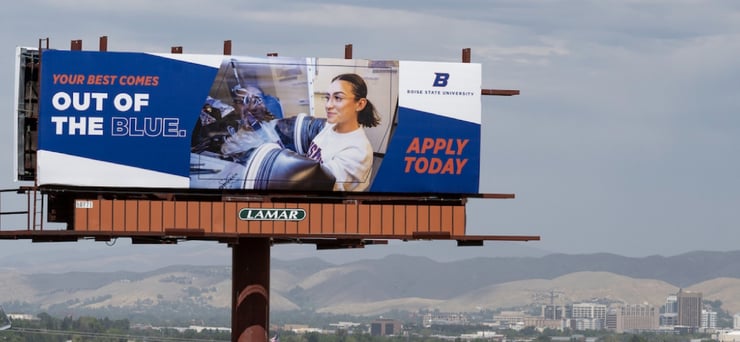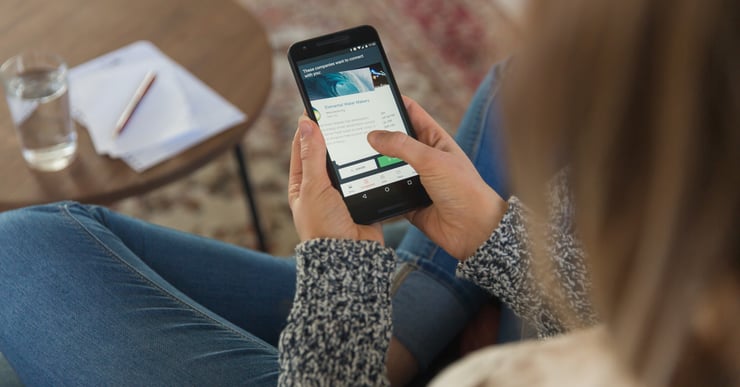In 2020, higher ed marketing and admissions teams diligently leaned into the headwinds of the digital and physical landscape at their feet. Many institutions quickly pivoted to expand their digital presence to secure and retain the relationships they foster with alumni, current students, and prospects that are so vital to conversion and engagement. The agility, time, and experience required to do this successfully leave many institutional teams drained or burnt out, not surprisingly so. Pressure to perform has rarely been higher.
Amid this shift to more robust and sophisticated digital engagement remains the ongoing conversation surrounding Apple's iOS14 privacy settings and its impact on social platforms like Facebook. This topic alone is causing continued disruptions to the media and marketing planning across all industries since social media platforms like Facebook serve as core pillars to many conversion-based and awareness campaigns.
There are extraordinary implications for higher ed marketing when we consider that 83% of teens reported iPhone ownership in 2018, with 86% responding that their next phone purchase was likely to be an iPhone.
The once table-stakes assumptions we could make with tracking and campaign engagement will now be upended. We're once again being pushed to pivot and evolve our campaign strategies to accommodate shifts in media consumption patterns, choices in data sharing, and the corresponding platforms' increased privacy and tracking measures.
Why do the iOS14 privacy settings matter? And, how may it impact your institution? Here are a few crucial takeaways for consideration as you forecast and plan for 2021 and beyond.
Actions to Take:
Verify your institution's domain, if you haven't already
- Verifying your domain within Facebook will ensure that your ads will continue running and tracking performance with minimal disruption.
Configure your event tracking for Aggregate Event Measurement
- Facebook will prioritize actions for optimization and will use Aggregate Event Measurement to limit the number of conversion actions that advertisers can optimize against. If you have active campaigns, now is a great time to go in and configure your events so you can self-prioritize the up to eight that may be tracked to avoid Facebook doing this on your behalf.
Identify new and continued ways to collect clean first-party data
- First party list collection has the potential to offset some of the data loss that your campaigns may experience in Facebook if you're running mid-or-low-funnel campaigns geared toward supporting enrollment type actions (RFIs, Schedule a Visit, Contact a Counselor, Apply)
- Generally, the continued collection of any type of first-party data will be helpful for integrated paid campaigns. Ensuring the clean and thorough collection of this data is beneficial for many campaign types in the future. Ideal data sets include first name, last name, email address, address (city, state, ZIP), and phone number.
Strategic Implications to Consider:
Facebook's Audience Network's data sets will shrink
- Facebook's programmatic platform will lose tracking ability off-platform for all users that do not opt in to be tracked. This will affect data used to purchase impressions on other websites and hinder Facebook's ability to identify the optimal places to serve an ad based on a brand's target audience.
Hyper-targeted in-platform campaigns will need to be re-strategized
- Facebook will no longer be capable of ingesting new browsing data from third-party sites if iOS14 users do not opt-in to share their data. So, institutions running narrow campaigns with very precise geographic, demographic, and budget parameters are most likely to be affected since those campaigns require a very specific set of data points to run successfully. It will be essential to monitor these campaign types and identify shifts in performance or review alerts served in-platform about additional implications or recommended changes.
Targeting pools for in-platform campaigns will be altered
- Users who opt-out of sharing data will be removed from retargeting and lookalike pools on the Facebook mobile app. Historically, retargeting has served as a strong action-driving, first-dollar targeting approach on social and display ad platforms. This is unlikely to change, but it will be important to consider that a segment of users will likely be lost to the iOS14 updates.
- The loss of some of the retargeting data set will also alter lookalike audience definitions. A core segment of users and their behaviors may be lost when they opt-out, skewing the approach to lookalike configuration.
What's important to consider is that iOS14's new privacy settings are focused on mobile app engagements, meaning that Apple's update will impact apps on Apple phones. The notification to opt-out of sharing data will be served once someone opens the app. This has extraordinary implications for higher ed marketing when we consider that 83% of teens reported iPhone ownership in 2018, with 86% responding that their next phone purchase was likely to be an iPhone. Apple's market share with this audience will likely continue to strengthen, providing more student prospects the option to not share their information, impacting institutions' ability to leverage Facebook and Instagram for deep, personalized prospecting campaigns they may have run in the past.
The potential to form personal connections with prospects and other audiences will not completely disappear with these changes. This complex era of ad strategy will foster new ideas for building personalization and intrigue with the right audiences at the right times, in the right places. While the pressure is on campaign marketers and social media strategists to determine how to alter institutional campaigns to support objectives while complying with platform changes, it also provides MarCom teams the opportunity to build a case for deeper cross-team collaboration throughout their institution to strengthen data-sharing and strategic insights.
If you're looking for more details on tracking these changes, here are some additional helpful resources related to Apple's iOS14 privacy updates and Facebook's response:
- Facebook Advertisers Brace for iOS 14 Tracking Prompt Fallout
- A Checklist to Prepare for iOS 14 Changes for Web Events
—
Sara Wallace is our Director of Marketing & Media Strategy and leads the Media Planning Division at SimpsonScarborough. Previously at Butler/Till, she holds an MA from SUNY Oswego and a BA from Hobart and William Smith Colleges. Sara lives with her husband and daughters in Rochester, NY. Learn more about Sara and the rest of our team here.


.jpeg)








